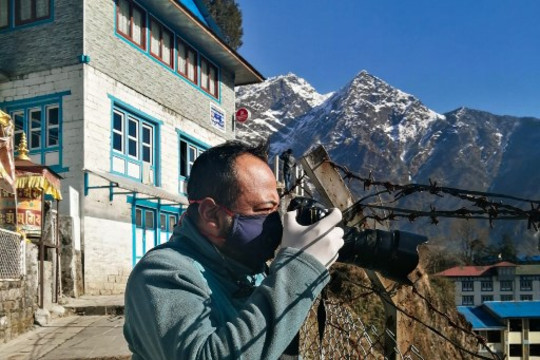Since the pandemic outbreak, the Federation of Nepali Journalists (FNJ) has focused on two fronts: the safety and security of journalists, both physical and professional; and mitigating false information and rumors. One of our first responses was to issue a guideline; on the dos and don'ts for reporting the pandemic adapted from WHO guides, with additional local context.
FNJ’s central committee decided to play an essential role in terms of the responsibilities of the media sector and to actively monitor the situation for journalists and provide needed support. Through this process, we heard that media houses were lacking even ordinary health care facilities and journalists were being left unpaid and unemployed. Even in the office, social distancing was not maintained and some media were not providing basic equipment like masks, sanitizers and gloves for their staff. Some journalists were facing financial problems from unpaid salaries too, and many had to work more hours than those specified under Nepal’s Working Journalists Act without additional remuneration.
Incidents of manhandling, intimidation, misconduct and obstruction of work against different journalists occurred in different parts of the country and seven key press freedom violations were documented from state parties, political parties and others.
During the lockdown, some media houses fired journalists and technicians. Some were sent on unpaid leave, while others were paid only as part-timers. Journalist living in rentals were obliged to come to their offices and some were forced to leave their homes as a result of objections by house owners and neighbours.
Following its monitoring, FNJ demanded special relief for media operations and media workers but this is yet to happen. It is clear journalists are playing key role after frontline health workers in the fight against the corona pandemic. We are continuing to urge government and media to provide protection equipment, regular health checks, insurance and access to information for journalists in the field.
Since the beginning of the pandemic, FNJ has coordinated with the Ministry of Health and Population and the Red Cross to make get protection materials for journalists. In that time, we’ve distributed over 5000 masks, sanitizers, hand gloves and hundreds of press jackets to journalists through our provincial committees, district chapters and by directly visiting media in Kathmandu. We’ve also coordinated with health and humanitarian organizations to provide regular health professional checkups of journalists.
After FNJ released its guidelines, the Press Council Nepal and FNJ together issued a 9-point directive on news related to COVID-19. Then on April 10, a high level Human Rights Monitoring team was formed under the National Human Rights Commission (NHRC) together with FNJ, the Nepal Bar Association and the NGO Federation of Nepal to monitor human rights during the lockdown. It has formed teams at all the seven provinces and 77 districts in Nepal and is mandated to monitor all human rights violations, including freedom of expression. We also organized a digital dialogue with heads of other journalists' unions and journalist leaders together with the Chief of Minimum Wages Fixation Committee for Journalists on April 14.
In Province No 1 the Provincial Government has now declared a relief package of NPR 5million (USD 40,500) for media confronting difficulties and safety equipment will be provided to journalists. Other initiatives are also being taken in the provinces and FNJ is coordinating with many local governments for support packages for journalists.
Our digital dialogue helped develop a common perception about how media houses and the media sector should move forward in the days and weeks ahead.

